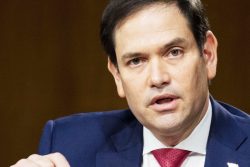It is still not too late for the Guyana Defence Force (GDF) to tender a dignified apology to those media operatives (and perhaps to the media fraternity as a whole) upon whom it visited some unacceptable discourtesies on Thursday January 25th after they had turned up at Ayanganna to cover President Granger’s address to the annual Army Officers’ Conference.
The media operatives, so the Guyana Press Association (GPA) says, were so incensed over what, reportedly, were the various instances of mistreatment which they had to endure at the army headquarters that they took a collective decision to depart Ayanganna, not bothering to remain for the President’s address and afterwards seeking an apology from the army.
Mind you, it is by no means uncommon for journalists to have to ‘endure’ discourtesies at public functions to which they show up, then have to press on, nonetheless, with their assignments. In the Ayanganna instance it appears that they took the position that the limits of their forbearance had been exceeded. The buck, they collectively decided, has to stop somewhere.
Based on the account of what transpired at Ayanganna on January 25th this newspaper, as it had said previously, thought that it was fitting that Ayanganna tender an apology. It was not our judgement that an apology would take anything off the ‘shine’ of the military. Nor was it ever a question of even remotely suggesting that what happened at Ayanganna was the result of premeditated malevolence on the part of the GDF. We felt, however, that in the circumstances an apology was the correct thing and that that was just the sort of gesture that would bring out that element of collective high-mindedness that can do no less than burnish the military’s image.
That being said, what is the big deal about a sincere expression of regret over an unfortunate series of occurrences which did not appear to be motivated by a deliberate desire to give offence? The fact is it appears from all that we have been told that the GDF fluffed its lines. So why is it that up until now we have not heard from the Chief of Staff or whomsoever is the designated officer?
The reality is that the military’s failure to tender an apology up until now is a microcosm of what has become a customary official dismissiveness of the media and its role that manifests itself in various forms of extreme rudeness and discourtesy. As far as some high officials are concerned it is entirely acceptable to treat the profession dismissively and not to bother unduly as to whether offence is either given or taken. That has changed little over time.
To return to the Ayanganna issue one finds it difficult to suppress the view that had representatives of some international organization or diplomatic mission been subjected to discourtesies identical to those inflicted on the media in the course of their attendance at an official function, an apology would have been forthcoming in short order. Media houses, it seems, are not deserving of such discretions.
Some of our state officials and institutions, have, over a protracted period of time, been deliberate in the disbursement of the most unbearable discourtesies to journalists. At the same time their perspective on the media and its role shifts conveniently between a tongue-in-cheek advocacy of media freedom on the one hand, and a cynical manipulation of the media that coincides with their image-enhancement pursuits. What this has meant is that here in Guyana, high-sounding pronouncements about media freedom have always sat cheek by jowl with simultaneous official attempts to control and more specifically manipulate the media as and when the need arises. Varnishing the truth ‒ ‘spin’, as this form of behaviour is known in the profession ‒ has always been of greater concern than proffering the unvarnished truth.
It is this serious deficit in the level of official regard for the media and its role that may well be responsible for the military’s refusal, (reluctance?) up to this time, to do the dignified thing and tender an apology. It is – or at least so it seems – yet another manifestation of an official mindset that places the media and its role pretty low on the food chain, except, of course, in circumstances where the media’s information-dissemination role fits in with the image-enhancing pursuits of officialdom.
The Ayanganna incident aside for the moment, it is the almost daily disrespect for the media that is galling, like the fact that in so many instances engaging officialdom in an effort to secure information on issues of public concern can be an acutely frustrating exercise on account of the antics of those officials, who impose their own brand of censorship on information dissemination,which antics are invariably couched in excuses that revolve mostly around their availability. This form of behaviour represents an obstacle to media freedom which even the strongest legislation would be challenged to eradicate.
Occurrences like the treatment meted out to the media contingent that turned up at Ayanganna to cover the President’s address and more specifically the GDF’s refusal, up to this time, to tender an apology is a microcosm of a much deeper problem that has to do with the manner in which the media are perceived. That problem can only be eradicated when, at a level that goes deeper than simply using the vehicle of Parliament to fashion legal guidelines for media freedom, public officials and institutions begin to cultivate the merited level of respect for the media. The media can only be truly free when it is accorded a level of recognition and respect that is consistent with the importance of its functions.
What obtains up to this time is an official articulation of media freedom dripping with cynicism and which serves little more than the image-management purposes of officialdom. Once the media serves that purpose its importance is summarily invalidated. Afterwards, it becomes altogether acceptable for high officials to treat the media like the principal character in the American writer Sam Greenlie’s 1969 novel, The Spook Who Sat By The Door, that tells the story of Dan Freeman, the Central Intelligence Agency’s first black agent who is accommodated only as a matter of convenience.
The media too must bear some responsibility for the manner in which it is perceived and treated. As a profession it has made no real collective effort over time to build strong institutions concerned with entrenching media freedom and with carving out the societal recognition and attendant respect that media professionals deserve. Part of the reason has to do with the unchanging and deeply damaging division between the state media and the privately-owned media houses which has served to undermine any semblance of collective professional outlook on media freedom and other issues including rights and responsibilities. The GPA, particularly, in its efforts to serve as a common ‘home’ for media professionals, has been a victim of the divisions in the media. While a new executive has just been elected there appears to be no strong collective enthusiasm within the profession as a whole to cultivate a collective sense of mission centred around leveraging the undoubted importance of the media. Cohesiveness remains hostage to the differing interests of the state media and the independent media houses.
The reality is that the state media will always be concerned with managing the image of government, and that pursuit will always depart sharply from what the independent media houses perceive as their own mission. That makes the fashioning of a common agenda that can serve, equally, the interests of media professionals employed in both the state-run and the independent media houses a difficult proposition.
However, there are still areas of common interest. As was mentioned in a previous editorial on the Ayanganna incident, the media operatives who took offence at the way they were treated and walked out comprise a mix of state and non-state medias functionaries. That, perhaps, is not without its own significance.









